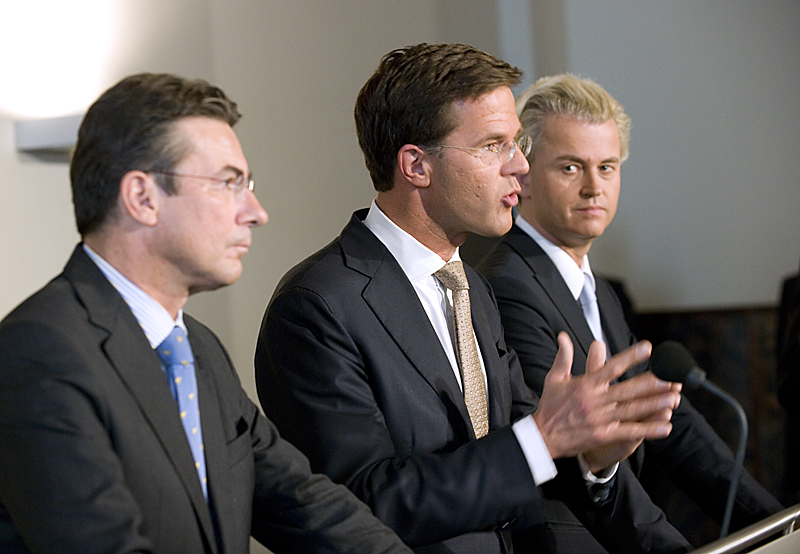Is it undemocratic to be excluding Geert Wilders from the coalition?
In this post-Brexit world, it is safe to say that we are all quite familiar with the phenomenon that is populism. In the past twelve months, we have witnessed numerous victories in the spirit of this new political buzzword, and in March, the famous Dutch tolerance was tested when their national elections rolled around.
Dubbed the ‘quarter finals’ of the European national elections that are taking place in 2017, they attracted international attention as the world watched to see whether resident populist, Geert Wilders of the Freedom Party, would scoop the top prize. However, the Netherlands held firm and awarded him second place. Despite this high placement, with just Mark Rutte’s Liberals ahead in first place, Wilders is still to be kept out of the progressing coalition talks that will form the new Dutch government.
In response, Wilders branded Rutte’s efforts to exclude him from the talks ‘undemocratic and unmarketable’. Wilders looks to be correct in one aspect: it is seemingly undemocratic to exclude him from the talks. But does that mean he needs to be included?
By the people, for the people?
If we consider the concept of democracy as we generally understand it in the Western world, Wilders’ exclusion is undemocratic. Although numerous definitions and types exist, at its root, democracy means to subscribe to a political system that is ruled by the people with a basic protection of civil rights. In the modern era, one of those treasured civil rights is universal suffrage no matter your sex, race, or class, and this is a right that exists for Dutch citizens.
In the March 2017 elections, Wilders received 13.1% of the vote, with a 3% rise since the last elections in 2012. In an election where there were 28 parties to choose from, this is obviously a significant victory. It’s clear he holds the support of a large portion of the electorate, and ignoring the views of his voters would be dangerous for the new Dutch government.
Arguably, Wilders’ voters would be being ignored if the Freedom Party is not included in the new coalition talks, and policies that a significant amount of the Dutch population voted for would not be implemented. If democracy means purely to put electoral power in the hands of the people for the purpose of equal rights and representation, then Wilders’ exclusion is undemocratic.
The Dutch way of doing democracy
The actual process of forming a new government in the Netherlands, however, means that it is not fully undemocratic to exclude Wilders from the ongoing talks. First and foremost, as it is difficult for a party to gain a majority in the Tweede Kamer, a coalition is almost inevitable in Dutch politics. This being the general state of affairs, the Netherlands is traditionally a country of political consultations and consensus, although the formation process has become more difficult in recent years.
One such example of this is the turbulent history of the Rutte-Wilders relationship. Although the Liberals and the Freedom Party originally cooperated in Rutte’s first term as Prime Minister, it ended badly when there was a breakdown in economic cooperation due to proposed austerity measures, and Wilders walked out. Citing this, the Freedom Party’s leftist socio-economic policies, and their principled objections to Wilders’ far-right rhetoric as the reasons why he would not work with Wilders further, even in a minority coalition, Rutte has continued to say that he wants his rival excluded from coalition talks.
Furthermore, the Volkskrant reported that most of the other parties will refuse to work with the Freedom Party as well. If the main goal in the formation of a new democratic government is to ultimately find political parties that are willing to cooperate, then it makes sense that Wilders’ party is excluded from the main talks, especially if there is a wide ideological clash.
— Geert Wilders (@geertwilderspvv) May 1, 2017
Excluding Geert Wilders to maintain freedom
Furthermore, Wilders’ far-right policies, especially regarding the status of Islam, go against the Dutch government’s position on freedom of religion. This principle states that the Netherlands believes everyone is free to define their own religious or ideological identity. It is also imperative in Dutch society that no one is restricted from doing so, thus developing the Dutch’s reputation for being liberal and tolerant.
Additionally, the freedom of thought, conscience, and religion is an essential element in the concept of modern democracy. By excluding Wilders from coalition talks, the Dutch government is recognising the right to religious freedom, which is a truly democratic principal which has underpinned evolution of Western civilisation.
Lessons learned
Let us ask ourselves: can we really allow a political party that preaches hate against an entire demographic and reduces them to a stereotype to be a part of a prominent European government? If we do so in the name of democracy, then I do not think we understand its correct definition.
On this note, it is also premature for news outlets to claim that Rutte saw off the far-right challenge. As already stated, Wilders came second in the elections and it is obvious that he has changed the state of Dutch politics. The political rhetoric of the nativist agenda has begun to influence mainstream parties and civil society, especially in the constant reference to Dutch national identity and the status of immigrants.
Wilders has not been fully rejected. The same could be said for the French elections that was won by the liberal Emmanuel Macron, with Marine Le Pen receiving only 35% of the vote. But that is still the largest vote for a far-right party that has ever occurred in a presidential election in France. This shows us that whilst right-wing populism has not triumphed in this European election cycle so far, we have not seen the last of this movement.



